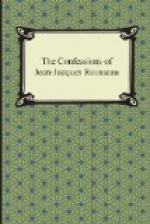I did not remain long in doubt about the reception which awaited me at Geneva, had I chosen to return to that city. My book was burned there, and on the 18th of June, nine days after an order to arrest me had been given at Paris, another to the same effect was determined upon by the republic. So many incredible absurdities were stated in this second decree, in which the ecclesiastical edict was formally violated, that I refused to believe the first accounts I heard of it, and when these were well confirmed, I trembled lest so manifest an infraction of every law, beginning with that of common-sense, should create the greatest confusion in the city. I was, however, relieved from my fears; everything remained quiet. If there was any rumor amongst the populace, it was unfavorable to me, and I was publicly treated by all the gossips and pedants like a scholar threatened with a flogging for not having said his catechism.
These two decrees were the signal for the cry of malediction, raised against me with unexampled fury in every part of Europe. All the gazettes, journals and pamphlets, rang the alarm-bell. The French especially, that mild, generous, and polished people, who so much pique themselves upon their attention and proper condescension to the unfortunate, instantly forgetting their favorite virtues, signalized themselves by the number and violence of the outrages with which, while each seemed to strive who should afflict me most, they overwhelmed me. I was impious, an atheist, a madman, a wild beast, a wolf. The continuator of the Journal of Trevoux was guilty of a piece of extravagance in attacking my pretended Lycanthropy, which was by no means proof of his own. A stranger would have thought an author in Paris was afraid of incurring the animadversion of the police, by publishing a work of any kind without cramming into it some insult to me. I sought in vain the cause of this unanimous animosity, and was almost tempted to believe the world was gone mad. What! said I to myself, the editor of the ‘Perpetual Peace’, spread discord; the author of the ’Confession of the Savoyard Vicar’, impious; the writer of the ‘New Eloisa’, a wolf; the author of ‘Emilius’, a madman! Gracious God! what then should I have been had I published the ‘Treatise de l’Esprit’, or any similar work? And yet, in the storm raised against the author of that book, the public, far from joining the cry of his persecutors, revenged him of them by eulogium. Let his book and mine, the receptions the two works met with, and the treatment of the two authors in the different countries of Europe, be compared; and for the difference let causes satisfactory to, a man of sense be found, and I will ask no more.
I found the residence of Yverdon so agreeable that I resolved to yield to the solicitations of M. Roguin and his family, who, were desirous of keeping me there. M. de Moiry de Gingins, bailiff of that city, encouraged me by his goodness to remain within his jurisdiction. The colonel pressed me so much to accept for my habitation a little pavilion he had in his house between the court and the garden, that I complied with his request, and he immediately furnished it with everything necessary for my little household establishment.




